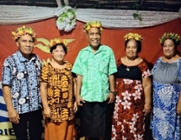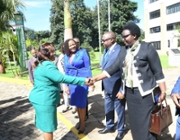Rwanda: capturing local action to achieve the SDGs
03 February 2023
Achieving the UN Sustainable Development Goals is important, but so too is being able to understand the role that activities play in reaching the targets. This is particularly true when it comes to local actions taking place in communities.
EU funding
One example of this is a CLGF project, funded by the European Union, which focused on improving the SDG reporting process at district, national and global levels. Informing the national SDGs report which, in turn, feeds into the Voluntary National Review report. The project focused on the local level in Kigali and the country’s 30 districts, centring on awareness raising, consultation with stakeholders via factsheets, and the creation of an electronic reporting tool, to enable a more systematic approach.
Factsheets
Building on a pilot project three years earlier, again funded by CLGF via the European Union, which sought to explain the importance of the SDGs and their localisation to the development process, it involved developing factsheets to highlight how the SDGs are streamlined into the District Development Plans. As these factsheets had become out of date, this more recent project sought to update the information, making it possible to share the method with all 30 districts.
An electronic reporting tool was seen as important to help and facilitate with data entry, storage, analysis and reporting of the localised SDGs indicators, with the key benefit being real time access to reported data from each of the districts. As soon as the data is entered and approved at district level, it can then be utilised in reporting, generating pivot tables and charts, without delays.
Electronic reporting tool
The officers using the tool received training and, to increase awareness of the stakeholders about the project and its outcomes, the training brought together directors of planning, and staff in charge of planning from all districts and the City of Kigali. During the training, participants were taken through the SDGs objectives and their respective indicators, as localised in factsheets aligned with the Districts’ Development Strategies. The participants were further trained on the use of the electronic tool from creating user accounts, data entry, monitoring and reporting. The monitoring tool then went live on the RALGA website; and creating the reports became possible. Flexibility in managing partnerships was critical for the project’s success.
Enhancing RALGA work
The tool also helps RALGA in its work as the national body representing local government and providing a connection between central and local government. Having championed the adoption of the SDGs to achieve good governance and local development, RALGA is better equipped with this tool to participate in that process with evidence-based data for advocacy, feedback and capacity building.
Going forward, to ensure the efficiency of SDGs reporting, consultation with other institutions responsible for reporting on SGDs has been initiated to ensure inter-operability of the developed tool with existing SDGs reporting systems.
The project faced major challenges, as it was implemented during the outbreak of the Covid19 pandemic. The related health guidelines and movement restrictions affected the development and validation of the factsheets, causing it to take more time than planned and validation was conducted virtually. Many of these challenges were mitigated by the existence of countrywide digital infrastructure as well as internet availability in Rwanda.
Lessons learned
The project demonstrated the importance of multilevel collaboration between central and local governments as two complementary layers of a single government and it created a sustainable and conducive environment for every stakeholder in local government to contribute and participate, allowing them to commit, monitor and report towards the achievement of SDG localisation in Rwanda. It also provided a good and dynamic learning process for future use.
The key lessons learned included understanding and appreciation of the following factors:
- For successful localisation of SDGs, it is paramount to make sure that all actors play their roles in order to boost participation, commitment and ownership.
- Districts need to fully own and facilitate the process to integrate them into national and local planning and budgeting tools.
- Multilevel collaboration is important as some data that is generated or collected at the national level may also be needed to inform local development.
- In the exceptional circumstances of the COVID19 pandemic, when virtual working was made possible, digitalisation became extremely important for sustainable development, as it allowed service delivery and access to information in the restrictive times of a pandemic.
The system is hosted in the National Data Centre, and can be accessed via the RALGA website on the link: https://sdg.ralga.rw
Similar projects have taken place in Ghana and Jamaica and CLGF hopes to hold a dissemation seminar on all these activities online in the near future.
Back to News





